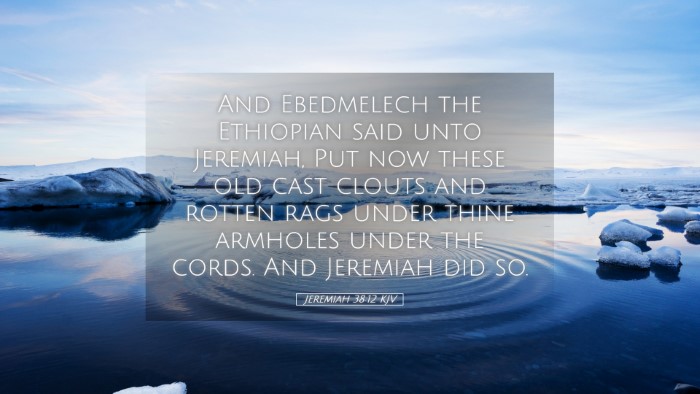Commentary on Jeremiah 38:12
Bible Verse: "And Ebed-melech the Ethiopian said unto Jeremiah, Put now these old rags and rotten rags under thine armholes under the cords. And Jeremiah did so." (Jeremiah 38:12)
Contextual Overview
The narrative of Jeremiah 38 unfolds in a time of great turmoil for the people of Judah. The prophet Jeremiah, known for his unyielding message of repentance and impending judgment, finds himself imprisoned for speaking the truth. Ebed-melech, an Ethiopian eunuch and servant in the royal court, shows compassion towards Jeremiah, a beacon of hope for the hopeless.
Insights from Public Domain Commentaries
Matthew Henry's Commentary
Matthew Henry emphasizes the profound character of Ebed-melech as a man of action who intercedes on behalf of Jeremiah. His courage and compassion stand in stark contrast to the surrounding indifference. Henry notes that Ebed-melech’s initiative in bringing rags to Jeremiah shows practical care, demonstrating that true faith is often manifested through acts of kindness.
Henry elaborates on the significance of the rags. He states that these "old rags" symbolize our vulnerabilities and the salvific grace of God, which meets us in our lowly states. By using rags, Ebed-melech illustrates that God often uses the simplest means to effect His purposes.
Albert Barnes' Commentary
Albert Barnes provides insight into the historical and cultural backdrop of this passage. He discusses the role of Ebed-melech as a non-Israelite who becomes a vessel of God's mercy. Barnes notes the bravery required to aid Jeremiah, especially during a time when his prophesied doom was met with hostility. This reflects the broader theme that God's truth transcends ethnicity and nationality, reaching all who are willing to embrace it.
In his analysis, Barnes highlights the imagery of the "rottenness" of the rags, which serves to remind readers of human frailty and imperfection. Importantly, he draws a parallel to the Christian community's responsibility to care for one another in times of distress, mirroring Ebed-melech's actions toward Jeremiah.
Adam Clarke's Commentary
Adam Clarke offers a detailed examination of the verse with a focus on Ebed-melech's character and motivations. Clarke underlines that Ebed-melech acts not out of obligation but from a deep-seated compassion. His willingness to aid a condemned man signifies a profound moral courage that challenges societal norms of loyalty and allegiance. Clarke also suggests that this moment encapsulates the biblical principle of loving one's neighbor, regardless of their standing or reputation.
Moreover, Clarke interprets the act of putting rags under the armpits to prevent injury from the ropes as indicative of God's provision in times of peril. This symbol serves to illustrate how God cares for His faithful servants even in their lowest moments. Clarke concludes by encouraging believers to be as proactive in caring for one another, echoing Ebed-melech’s example.
Theological Reflections
This passage invites profound theological reflection on themes of compassion, justice, and inclusion. Ebed-melech's actions raise critical questions about the responsibilities of those in power versus the marginalized. The courage exhibited by Ebed-melech also acts as a testament to the transformative power of faith and love.
Moreover, the text serves as a poignant reminder of God's provision. Just as Ebed-melech interceded for Jeremiah, so does God intercede for His people, often through unexpected means. This reflects the truth that God's ways are not constrained by human understanding or arrangement.
Application for Today
This passage holds valuable insights for today’s church and its leaders. It challenges pastors, theologians, and scholars to foster a spirit of compassion and service within their communities. Ebed-melech's example urges believers to look beyond their circumstances and to respond to the needs of others with love and action.
Furthermore, the themes of marginalization and advocacy found in this text compel the church to engage with social justice issues, particularly those that affect the oppressed. As Ebed-melech was a voice for Jeremiah in the shadow of imprisonment, so should the church advocate for those who cannot advocate for themselves in contemporary contexts.
Conclusion
Jeremiah 38:12 reflects a narrative full of powerful lessons about faith, courage, and the responsibility to care for others. By considering the insights of Matthew Henry, Albert Barnes, and Adam Clarke, one gains a richer understanding of this text's implications. Both individually and collectively, believers are called to embody the spirit of Ebed-melech—one of compassion and action—living out their faith through tangible acts of kindness and justice.


